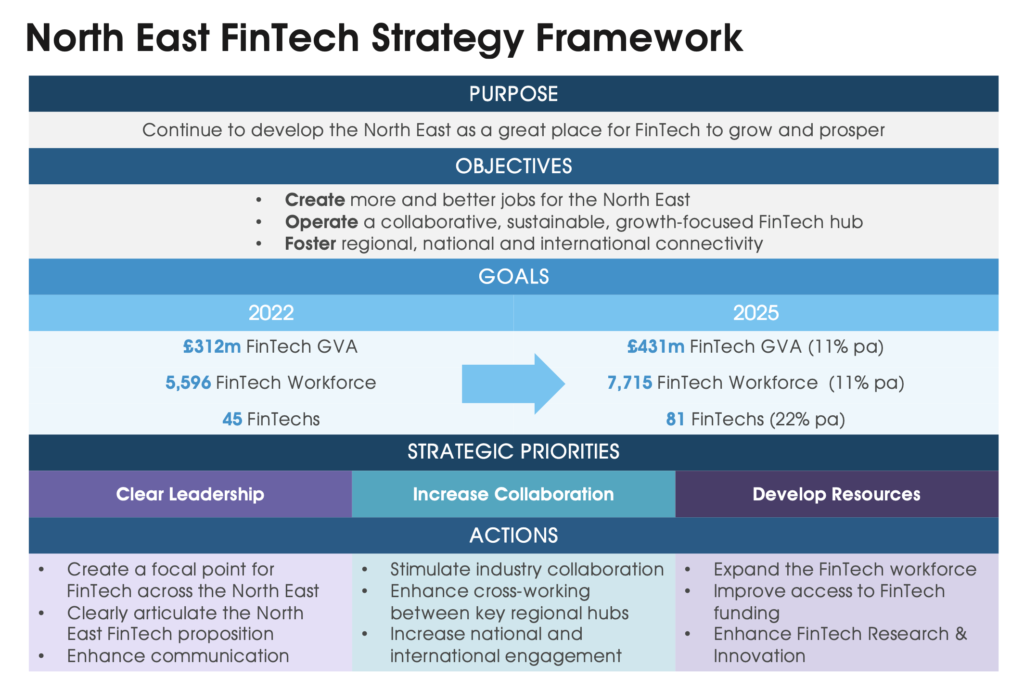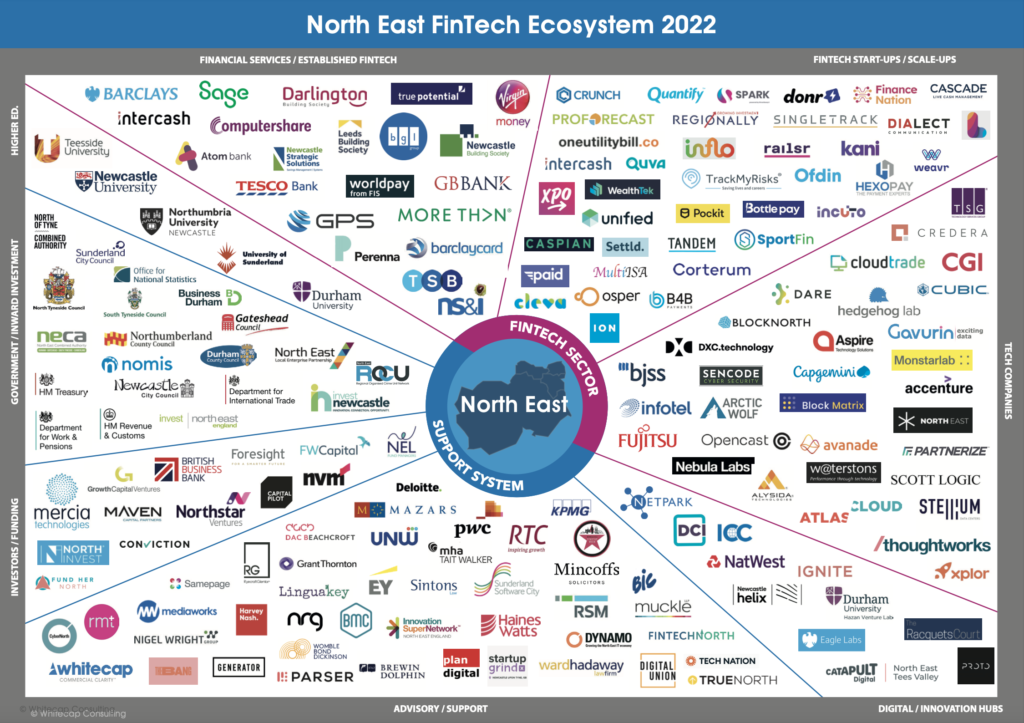 The new strategy has been developed by Whitecap Consulting with the support of key stakeholder organisations in the public sector, private sector, and higher education. It outlines a high level plan for the region to create more and better jobs, develop a collaborative, sustainable, growth-focused FinTech hub, and to foster regional, national and international connectivity.
The new strategy has been developed by Whitecap Consulting with the support of key stakeholder organisations in the public sector, private sector, and higher education. It outlines a high level plan for the region to create more and better jobs, develop a collaborative, sustainable, growth-focused FinTech hub, and to foster regional, national and international connectivity.
In addition to the new jobs, the Gross Value Added (GVA) created by FinTech is forecast to increase 11% per year, to reach £431m in 2025, and the number of FinTech firms is expected to nearly double to 81 (currently 45). The report finds 76% of the region’s FinTech firms are currently based in Newcastle, Gateshead or Sunderland, with 11% in Durham, and 9% in the Tees Valley region.
The project follows an independent national strategic review which identified the Newcastle and Durham area as one of the top ten FinTech clusters in the UK. The Review of UK FinTech, published in February 2021, showed the fast-growing sector generates £11bn of GVA for the UK each year. The work has been supported by key regional stakeholders including Atom bank, Dynamo North East, FinTech North, Invest Newcastle, Invest North East England, Newcastle Strategic Solutions, Newcastle University, North East ROCU (North East Regional Organised Crime Unit), North of Tyne Combined Authority, North Tyneside Council, Northumbria University, and Sage. The strategy was launched at an event in Newcastle on 19th October, hosted by Womble Bond Dickinson.

FinTech, the use of technology to enhance the delivery of financial services, is a growth industry in the wider North East region that has been driven by substantial levels of investment and employment. This investment has paid dividends, with a 58% increase in the number of firms operating in the FinTech sector over the last 3 years, including an 81% increase in the number of FinTech startups and scaleups, nearly a third of which are organisations that have chosen to expand their operations into the North East.
Sir Ron Kalifa, author of the Kalifa Review, says:
“I am delighted to see the publication of a FinTech growth strategy for the North East. In developing this 3 year strategy, the group of regional stakeholders that have worked with the Whitecap team have collectively delivered against a key objective that was laid out in my Review last year. I hope the new strategy will generate opportunities, secure investment and can help create jobs that will help the FinTech sector and economic prosperity of the region and the UK.”
Richard Coates, Managing Director at Whitecap Consulting, says:
“We are delighted to publish this strategy to support the future growth of FinTech in the North East. The key to successful implementation will be the way the region takes ownership of the actions and works collaboratively to deliver them. Our analysis shows that the growth of FinTech in the North East over the last 3 years has primarily been driven by tech sector expansion and inward investment success in attracting new FinTech and tech firms to the region.”
 Dr Henry Kippin, CEO, North of Tyne Combined Authority, says:
Dr Henry Kippin, CEO, North of Tyne Combined Authority, says:
“Digital and the digital sector is a key component of our economic vision, and our existing investments in skills, infrastructure and innovations are aim to cement our region’s status as one of the most exciting digital economies in the UK and around the world. The recent success of the FinTech sector showcases the very best of the North of Tyne and wider regional economy; collaboration between public, private and higher education, innovation across sectors and supply chains, and clustering of expertise which proves hugely attractive to inward investment. The work of Whitecap and partners brings to life these intangible characteristics into a strategy with real clarity and ambition that we can, and should all get behind.”
Rachel Burdis, Inward Investment Manager, Invest North East England, says:
“The North East’s growing FinTech community will greatly benefit from a regional strategy, focused on increasing business activity, funding and sector growth. We have supported this action orientated Whitecap report, which highlights some of the priorities and prospects for this sector, as well as the ecosystem we have here. We look forward to continuing work with local partners on this plan and championing the region, whilst promoting the unique opportunities for investors.”
Dawn Dunn, Digital and Tech Lead, Invest Newcastle (part of NewcastleGateshead Initiative), says:
“Now is the time to accelerate, grow and build on our strengths. To do that we needed a collective and defined strategy, and I was delighted to play a part in this journey. The North East Fintech Strategy is critical to the future growth of the sector and will support the development of our international strategy and position as a leading, collaborative, and diverse FinTech cluster. We have seen phenomenal growth, and this strategy will support us to define the opportunity to investors within national and international markets – promoting the region as place where fintech businesses can not only start up, but scale at pace. This is our first step towards delivering a tangible strategy that will ensure that the sector continues to create jobs, develop talent, and attract inward investment. I look forward to the future as we continue to work together to support this high-growth sector to thrive.”
 The strategy to develop the FinTech sector over the next three years is built on the foundations of qualitative depth research and online survey insights, and has involved consultation with more than 70 key stakeholders, as well as wider engagement via a session at FinTech North’s North East conference in Newcastle in July. It identifies three strategic priorities, each of which is associated with a set of recommendations which break down into a total of 18 specific areas of action. The three strategic priorities relate to creating leadership, increasing collaboration, and developing resources.
The strategy to develop the FinTech sector over the next three years is built on the foundations of qualitative depth research and online survey insights, and has involved consultation with more than 70 key stakeholders, as well as wider engagement via a session at FinTech North’s North East conference in Newcastle in July. It identifies three strategic priorities, each of which is associated with a set of recommendations which break down into a total of 18 specific areas of action. The three strategic priorities relate to creating leadership, increasing collaboration, and developing resources.
Download the North East FinTech Strategy 2022-25

